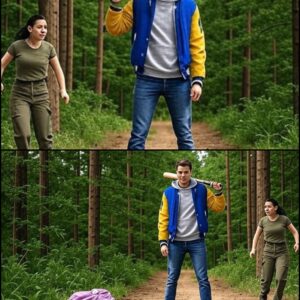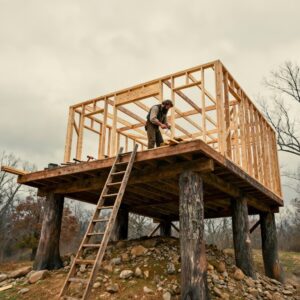When my aunt Margaret died, everyone spoke in polite, rehearsed phrases: “She had a long life,” “She was such a wonderful soul,” “We’ll miss her terribly.” They folded themselves into the correct shapes for the funeral, the reception, the rote condolences. I listened to the words and felt nothing at first—only a hollow, disbelieving quiet where her laughter used to be.
Margaret had been the axis of my childhood summers. While my parents worked shifts and argued about money in the kitchen, she taught me to peel potatoes without losing fingers, to read by lantern light when the power went out, to trust the slow work of attention. Her cabin was a patch of unmade heaven tucked on the curve of a lake, two hours from the city: a place where you learned to sharpen knives and to mend holes in sweaters, where you discovered that the world would not fall apart if you learned to do things yourself.
“Claire,” she’d say, tapping the ash of the cigarette she no longer allowed herself to smoke, “this place belongs to whoever will keep it with hands that care. Not the ones who want it for trophies.”
When the lawyer read the will a week later and announced, “I bequeath my cabin and all associated property to my niece, Claire Robbins,” the room went unexpectedly, mercilessly still. I could feel my heart slamming against ribs that had forgotten how to be calm. It was not money. It was not a stock or a dusty share certificate. It was wood and beam and the lake and every late-night conversation we’d ever had leaning over a pot on the old stove. It was her.
I had expected my parents to be pleased, maybe relieved—an asset I would protect, a place where I might retreat from their small cruelties. Instead their faces hardened into something that resembled calculation. My mother’s sneer arrived like a shadow falling across the room.
“A cabin?” she said, loud enough for a few heads to turn. “Claire, really? How quaint. Do you even know what you’re signing up for? That place is a white elephant.”
My father was worse. He folded his hands and said, “We’ll make sure it doesn’t go to waste. We’ll manage it for you.” He said that bit with the certain smile of someone who uses words like “manage” when what they mean is “control.”
They believed the world was divisible into things they could arrange, the same way my father arranged dinner plates at the table when the family came together: a precise, glossy order. But the cabin had been Margaret’s rebellion against belly-deep order. It did not belong to the kind of people who counted value in trinkets and auction lists. She knew that. And she knew them.
For three nights after the reading I walked the rooms of her small apartment, touching the edge of the crocheted tablecloth, folding the list of the gardener’s days into my wallet, rereading the line in her handwriting—to Claire, because she understands—until the words fit like armor. That was the first odd thing I noticed: Margaret had been meticulous in a way that made no sentimental sense. The will, the property deeds, the list of the gardener’s weekly visits, the scribbled map with the cabin circled in red—everything about her legal affairs looked as if she had expected a fight.
The first time my mother asserted their claim, she did it with all the theatrical grace she had acquired in managing households and other people’s expectations.
“You shouldn’t handle it on your own,” she said over the phone, the day I planned to drive up and sit in the cabin by myself. “It’s a lot for a young woman. Property taxes—repairs—liability. Why not let us help? We’ll be doing the heavy lifting.”
When she spoke the word we, the possessive leaned forward and tried to occupy the room. I listened longer than I used to.
“You mean your hands,” I said. “Aunt Margaret left it to me.”
My father came the next weekend. He arrived in his buttoned shirt, with an anxious smile and a pocketful of printed forms. “We’ll put it up for sale,” he said. “You have the deed, sure, but think about capital. That property could be converted into a rental. Turn it into something profitable.”
“You would take it from me?” I heard the words out loud and then I saw my pale aunt’s face, the way she’d shake her head when he spoke of profit. “Aunt Margaret was specific in the will,” I said. “You can’t do this without consent.”
He leaned in, lowering his voice. “Consent is flexible in families. She was old. You know how she—”
Scattered. Sick. Frail. They floated in his half-sentence. Those were the tools of pretense my parents used—small cruel conveniences marshaled to obtain what they desired. They were good at telling stories about people; they used anecdotes like nets.
It might have washed over me—an old fight to be ignored—if Margaret had not prepared me differently. One rainy afternoon while cleaning the cabin’s drawers the week after the funeral, I found a wooden cigar box tucked beneath a stack of quilts. Inside were sealed envelopes addressed to me in that looping hand I’d known since childhood.
“Claire,” the first began. “If you have this, it means I picked you because you keep things. People like your parents see only diamonds, letters that can be sold, things that make good conversation at dinner. They will claim because they always do. I saved you a few things. The deed, the original blueprints behind the false panel in the study. The tax receipts. Don’t let them fool you.”
There were more: notes, a letter from her lawyer, a hand-drawn map of the property boundaries, names of neighbors who would testify to how she’d maintained the place, even an old receipt showing the date of her signature on the will with a notary stamp. She had not left things to chance. She had anticipated. She had thought like a woman who had seen greed like weather and built a roof that could withstand it.
I felt, frankly, relieved. Margaret had been deliberate in a way that served me beyond sorrow. She had done what a wise person does when they leave: they plan.
With the folder of documents I felt armed. Not with a weapon but with evidence. The kind of evidence that makes bluffers falter. I drove home and slept for the first time in weeks without the constant buzz of contained anxiety.
My parents interpreted my silence as weakness. They did not understand that I had learned reserve. My mother dialed my number and pestered me with “practical” talk—taxes, trusts, management—masking what was an old script dressed in new clichés. The community gossip churned. My parents went to cousins, to uncles, to the neighbor who knits and knows everyone’s business. I expected them to be arrogant and relentless. What I hadn’t expected was the personal coldness that would arrive when they realized their usual threats would not frighten me.
I placed the papers in a banker’s box and drove to the lawyer’s office. Mr. Harrison was a small, trim man with eyes like slate and a stubborn, old-fashioned integrity. He leafed through Margaret’s file as if reading a story. “She put her house in order,” he said. “There is no ambiguity here.” He circled the notarized will with his pen as if emphasizing a point. “And she included a clause protecting the property for the beneficiary with stipulations that make contesting it difficult.”
“What stipulations?” I asked.
“Testimony of neighbors, specific maintenance receipts, a clause preventing transfer for x years unless the owner chooses to transfer. She also established a trust to cover taxes and maintenance.” He smiled at me in a way that relieved the fear I’d been carrying. “She was strategic. She knew what people like your parents might do.”
“What is it you feared?” he asked then, quiet. “That they would take the cabin?”
“Yes,” I said. “That they will take what she willed, because taking has always been easier than earning.”
He placed a hand on the file. “They will try, but this will not be easy. Margaret did not leave a loose knot. She tied it tight.”
And yet I did not expect the thing they did next. They decided, in true family fashion, to make the fight domestic—insinuations, manipulations, invitations masked as concern. My mother started with letters—polite suggestions of how a sister might help ease the burden that property imposes. She brought up my youth, my supposed incompetence, the same accusations she had used all my life: too sentimental, too dreamy, not practical. She introduced the rumor that Margaret had not been “in her right mind” when signing the will—a calumny intended to make my grandmother into a co-conspirator in her old age.
“You’re being dramatic, Claire,” my mother said on the phone. “You must be tired. Sleep and think. Let us handle the boring parts. We can take care of the taxes.”
When my mother disparaged the memory of the woman who raised me to read maps and mend roofs, something hardened in me I had never seen. I thought of Margaret’s hands, knotted with years of work; the careful handwriting in the envelopes; the photograph on the mantle where she grinned with a cigarette in one hand and garden shears in the other. She looked fierce and soft at once. They would not trivialize her.
There were visits. My parents turned up with histrionic tales of the cost, with sympathetic faces and murmured counsel about probate court. They had a lawyer now—the lean, polished kind who could whisper to other lawyers in places where lower ceilings made deals. He brought forms, blank and ready for signing. Their posture was one of ownership. They believed that blood gave them license.
I invited them to the cabin. I wanted them on my turf—not at my house, where they could play the role of helpful family members, but at the place that had been Margaret’s heart. When they arrived, they wore clean hands and weekend suits, the costumes people wear to make a rural house something they could own. They walked the property like buyers at an auction.
We sat on the porch; the lake lay placid beneath summer’s stubborn heat. A breeze moved the trees as if whispering arguments back into the world. I poured lemonade and sat with my aunt’s letters in my lap, the envelopes warm from the sun.
“You really did all this?” my mother said, incredulous, as if books and a document could be transformed into a life.
“I did,” I said. “She wanted me to have it.”
My father’s mouth tightened. “You realize the upkeep—”
“You realize,” I interrupted, “Aunt Margaret left a fund for upkeep. A trust. It’s all set up with the lawyer.”
“How thoughtful,” my mother said, with a voice that was both sweet and metallic. “You must have a great aunt to think of this.”
“I do,” I said. “She thought I would care for it.”
I watched their demeanor change as I removed papers from the folder: blueprints hidden behind a loose panel—she’d said there would be a panel; community letters from neighbors who testified to her steady care; the notary stamp. The facts took up the room like light taking up space. My father’s face moved from bluster to a face that had miscalculated.
“There are ways to keep a property in the family when the rightful beneficiary has neither the time nor the acumen,” he said. “We could manage it together.”
“You mean you could manage it,” I said.
He laughed then, the short, angry sound of a man who had been deceived by his own presumption. “You are so naive, Claire.”
He believed I would shrink. But my aunt had taught me that shame—and the expectation of it—was an emotional weapon. My aunt had armed me with documents and trust funds but also with a kind of stubborn sanity: do not apologize for your inheritance if it is a responsibility given in love.
After that visit the tone escalated. My parents began to speak in courtesies that came with conditions. They wrote letters to Margaret’s neighbors, circulated stories that she had been confused when making the will, hinted that perhaps a nurse had been with her when the documents were signed. The green-eyed rumor spreads quickly in small towns, and for a few weeks I watched it smear like oil across a pond. I watched my aunt’s friends frown and worry. I watched my father’s allies call and whisper.
I buried myself in paperwork and neighborly support. Mr. Harrison’s calmness was an anchor; Mrs. Kline from next door—who’d once had a cup of tea at Margaret’s kitchen table—brought casseroles and witness statements. “We were there when she and you walked the property last spring,” she said. “We know she was clear and certain.”
If there is a single magical thing small communities do well, it is that they remember the truth when others are trying to sell a version of it. That memory became our shield.
Still, my parents did not relent. They had an inventory of men who could whisper. They threatened legal action. They hinted at more public disgrace, printed affidavits for journalists who would be willing to present the story under the banner of “family dispute.”
“I’ll not be bullied,” my father said at one point. “This is more than a cabin; it’s a resource. You’ll regret trying to keep it all.”
“Try me,” I said, and I felt the words like iron.
They did. They hired a lawyer. They wrote letters. They convinced a cousin to take them to coffee and corroborate small half-truths. The tests of the heart always come with small, precise cruelty—an invitation to a false reconciliation, a rumor dripped to a neighbor. They thought these things cumulative, like stacking wood in a corner, that eventually the piles would be high enough to set the whole room alight.
Aunt Margaret, though, had left more than a will. She had left people who loved her and could speak her story. She had left the record of her own life in receipts, signatures, and small stories that matched the signature of truth. She was an old-fashioned woman who believed that care could be documented and that kindness could be corroborated. It felt almost like sorcery when her handwriting and her neighbors and her lawyer began to aggregate into a fortification.
On a wet morning when the light looked like paper, my parents annexed themselves to the steps of the cabin with their lawyer in tow. They had some faint idea that the legal system could be rapped like a knuckle and the rightful owner’s hand might loosen. They had been wrong about a thousand little things already: my aunt’s mind, my quietness, my resolve.
“I’m offering you an opportunity,” my father said to me as if he were bestowing a favor. “Sign over the property and we’ll manage it. We’ll make sure it continues to be used. You can have visiting rights.”
I felt an image pass: a woman handing me a tiny visitation schedule like a child’s permission slip. “No,” I said again, and this time more quietly. “You abandoned her when she needed you. You cannot pretend that visiting hours is a reward.”
They left angry, muttering about how things would not be easy for me. The neighbor who’d once brought preserves watched them drive away and then set her jaw. “You have the papers and the townspeople,” she said. “That’s what matters.”
I had what my aunt left me—a house, a trust, and a community that didn’t want a secondhand version of Margaret to be sold at discount. But owning it was not enough. The real work was in keeping it. In learning the subtleties of roof and foundation, learning the names of the trees and where frost forms and how to arrange a bedside lamp so the light does not make the purple curtains look bruised. That work is ordinary, tender, relentless. It was what my aunt had expected me to do.
Some nights I would light the woodstove and sit at the table with Margaret’s chair empty across from me. The glow in the room would look like the memory of her and sometimes I would feel her—like the wind has memory—sitting there, tapping an ashtray she’d left on the sideboard, mouthing the sentences she had said about not letting people take what they had not earned.
The days lengthened into a summer that was not easy but was honest. I refreshed paint, learned to use the tractor my aunt had kept in the shed, and discovered that the neighbors—those small, stubborn people—were fierce allies. Mrs. Kline and her husband brought over jars of jam and promises of testimony. Young Sam from across the lake lent me a hand to fix the dock. Together we became a kind of village scaffold, supporting what needed to be preserved.
When autumn rolled in and the leaves made the ground look like a confetti of things that had lived and fallen, my phone rang one wet evening. My parents were calling from the city, their voices brittle with anger and something else—fear, maybe. “You’ll see,” my father said. “One way or another, we’ll get what we need.”
I closed the phone and sat by the window for an hour, thinking. If they tried legal tricks, I had the paperwork. If they ranted to the cousins, I had the neighbors. What I needed, I realized, was a way to make sure the house was not just legally mine but functionally impossible to contest without displaying their own rot.
I planted a garden the next weekend—a stubborn row of vegetables behind the cabin, the kind Margaret would have loved: tomatoes, kale, a trellis of beans. The act was small, practical, defiant: a living thing anchored to a place. My aunt had given me the blueprint, the deeds, the trust, and now I gave the cabin something else of mine: a life.
Part Two
Threats have a way of losing their shape when you ignore them long enough. My parents learned this slowly. Their calls grew thinner, their letters less frequent. At first they pushed and prodded and then, like a wave beating the shore, their energy wore out against the stubbornness of truth and the stubbornness of people who love the land that gave them summers.
They retaliated in subtler ways. My father tried to exert pressure by suggesting I hire contractors with dubious credentials. He knew I was not sophisticated in all the mechanics of property, and he hoped to find a rotten corner in the paperwork—some small omission or a tax receipt spelled incorrectly—that could be used as an accusation. They thought to find a sliver of error and declare the whole thing contaminated. But Margaret had not left a document missing. She had worked with a lawyer to make sure every tax receipt had a counterpart, every signature a witness.
At one point, they attempted a different tack. My mother arrived at the cabin and sat on the porch for the earliest hour of light that autumn offers, folding her fingers and looking, for a second, like an old woman who had run out of arguments. She told me a story of their youth, about decisions made when they were younger and poor, about how they had given up things to survive. She tried to paint the fight as a family’s necessary calculus.
“If you love me,” she murmured once, “you’ll let this go.”
It was perfidy wrapped in familiarity. Love, in their mouths, had always meant compliance. My aunt’s legacy, however, was not a purse to be begged for but a responsibility to be kept. I said no, and my refusal made them flinch. For a few days after, their calls were filled with thin, empty pleas. When guilt failed, they turned to bargaining, and when bargaining failed, to threat.
The first legal attempt came six months after Margaret’s funeral. They filed for contesting the will. The petition alleged undue influence, claimed my aunt had been in an impaired state and suggested that the will was not the product of a clear mind. They had lined up a medical expert and a handwriting analyst, expecting that the weight of professional opinion would topple a document penned by a woman sixty years my senior.
We prepared. I sat with Mr. Harrison and reviewed the evidence: witness statements from neighbors, receipts for her garden fertilizer, appointment logs from the doctor that showed a lucid woman scheduling her affairs; even a tape of a recorded conversation in which my aunt discussed the deed and her reasons for choosing me. The lawyer was a blade of patience. He cross-referenced signatures, notarized pages, and prepared to string together the narrative of Margaret’s intention.
The day of the hearing was bright, mercilessly ordinary. The courtroom smelled of old wood and disinfectant. My parents sat opposite me with their lawyer, faces practiced into expressions that had to be convincing. I watched my mother’s hands tremble now with a different emotion; grief perhaps, or the realization she might have been wrong. She had always been good at pretending the world was easy to rearrange; the courtroom didn’t let you pretend.
Mr. Harrison took the stand with Margaret’s affidavit and the locals’ testimonials beside him. He laid out the receipts and the letters like building blocks, methodically demonstrating the name and signature on each. The neighbor, Mrs. Kline, gave the clearest testimony. “I remember her going to the notary,” she said. “She knew what she was doing. She said, ‘Leave it to Claire. She’ll keep it.’”
The judge listened with a face that read like a map; he did not speak until the end. He asked a few pointed questions and then, with a softness that was almost tenderness, he ruled in our favor. The contest was dismissed. My parents’ lawyers sat with their mouths open, the small world of their assumptions collapsing like a house of cardinals.
My parents drove home after the hearing taut with humiliation. Their faces were the color of someone who had been drained. For them, the only path left was either to retreat or to escalate. They chose escalation for a while—they called, attempted to cajole neighbors, threatened the charity and community events their friends held. For a time, the campaign was loud and petty: gossip, whispered comments at the church fair, pictures in which my aunt was described as “unduly influenced.”
But the truth has a way of accruing allies. People who had known Margaret for decades saw the pattern: she had always been clear about the cabin. Their loyalty built a dam against gossip.
I think the moment that truly severed the old-world attachment my parents had was not the court’s ruling but the moment when an empty-handed man realizes that the years spent trying to be a someone—an owner, a manager, a voice of command—have been squandered on the wrong things. For me, that was when they stopped calling every weekend. Silence, in that case, was its own verdict.
The aftermath of the legal victory was not fireworks and champagne. It was the slow, tender work of unwrapping my aunt’s life and setting things gentle. I continued repairs, but with a new rhythm. Instead of painting hastily, I asked neighbors for their guidance. I taught myself to fix a leaky roof, to mend the place where rain had stolen a patch of plaster, to sand the rail and restore it.
More than that, I transformed the cabin into what Aunt Margaret intended: a refuge. I invited people who needed it. A young couple come to shake off the city’s constant hum. A neighborhood widow come to learn how to can jam. A teacher from the school who wanted to bring a group of children for a day of learning about the woods. Margaret had left it to someone who could keep it functioning as a place of life, and so that is what I did.
My parents showed up from time to time, their faces hollowed by something like defeat. Once, my father came in the late spring with a small bouquet of wildflowers and watched while I trimmed an overgrown path. He did not offer to take over; he did not ask for permission. He asked for nothing, only watched, as if observing a small miracle that had happened without his approval.
“I wanted to be proud,” he said once, his voice small. “For all my life I wanted people to see me as someone who can provide. I thought taking care of this place would be the way.”
“And yet you left it to someone else,” I said.
He nodded. “I suppose I did.”
There were moments when I almost considered reconciliation. Sometimes I imagined calling him by his childhood nickname and offering him a place to sit on the dock and watch the sun. But he had, for long stretches, been the kind of man who measured his worth in ownership of things rather than in presence. He had sold the best parts of himself to that ledger.
So I let him watch. Let him see the life that continued without his control. It became its own gentle punishment, the kind that teaches better than cruelty.
Time, the most faithful of healers, did its work. The bombast that had marked my parents’ early attempts melted into something quieter: occasional emails, a card at Christmas, a reluctance with which they would walk the property when I invited them and then not walk up to any doors unless I said it was alright. They paid their respects in small ways. They learned the art of standing at a distance.
Meanwhile, the community that had watched the drama unfold wrapped around the cabin like a hand. We started a small residency program for young artists: a scholarship to stay and paint and write and breathe for two weeks at a time. Margaret would have loved that—young people learning the way of the wood and the long work of being with raw materials. The first artist left a painting of the dock at dawn that now hangs in the cabin’s main room. It looks like a promise.
Sometimes late at night I think of the little wooden box Margaret had left me and the way each envelope had read like a gentle map to a safe life. She had taught me to keep things in order so that greedy people could not scramble them. But more than that she taught me the practice of tending: tending the garden, tending the wood, tending the stories we tell each other when the weather is soft and the tea is warm.
On the fifth anniversary of her death, friends and neighbors gathered for a small service by the lake. We lit lanterns and set them afloat, watching the small orbs drift until they were swallowed by the water’s horizon. People told stories about my aunt—how once she had caught a trout so large it bent the hook; how she had taught my cousin Ellie to knit; how she had always left a corner of the garden for anyone who needed herbs. They laughed and cried in the way people do when they are not afraid of being seen.
My parents came, though they were late and sat in the shadow of the pines. My father stood awkwardly at the back, his hands in his pockets. My mother’s eyes stayed on the lanterns. They said nothing to me; they did not need to. That evening the silence was a kind of answer and a small mercy. They had come without pretense, and that mattered more than anything.
When the last lantern floated free and joined the dark, I felt the cabin settle around me. I felt the weight of responsibility put into my hands like a warm stone. It was a quiet conclusion: not victory that thrills but a victory that tends. Aunt Margaret had known what she was doing all along—choosing a keeper over a claimant, a steward over an opportunist. She had chosen someone whose hands knew how to fix things.
The cabin, contrary to the old logic of drama and greed, had not been a prize to win. It was a keeper for quiet things: conversations at midnight, jam cooling on the counter, a small residency where art grows without pretense. My parents’ attempts had shown me the difference between greed and care. They had shown anyone who watched that legacy is not an object but a living practice.
Years later, when my hair had grown a little streaked with silver, and when I moved among the rooms like someone who knew every creak and seam, I would sometimes stand on the porch and look out over the lake. The dock would be patched, the garden full of the stubborn generosity of people who plant things to have the world give back. Children would shout from the water, and the dog that always found its way to my lap would doze in the shade.
From time to time a younger woman would appear at the gate, eyes wide as if the cabin were a myth. “My aunt told me about this place,” they would say. “She said someone kept it right.”
That was what Aunt Margaret had given me: not just wood and window but the license to maintain a kindness so rigorous it would be hard for anyone to undo. My parents had thought they could take it because the world taught them the wrong measures. They learned that some inheritances are not mere assets but compacts: a promise to keep, to guard, to give.
On a soft morning in late spring I wrote a letter to my father. It was short. I told him I had received the patchwork tablecloth he had once loved from his mother; that I used it on holidays; that his grandchildren—when there were grandchildren—would one day know the smell of lemon polish and jam. There was nothing in it that demanded a reply. There was only an invitation, as quiet as a wooden step, to be part of the life he had tried to purchase.
He sent a postcard in return two months later with three lines: The dock looked good. The house smells of wood smoke. Thank you for the jam.
It was small, and that was enough. We had been put to the test not in spectacle but by the patience of ordinary days. In the end, the cabin remained a place of work and story and laughter, a refuge that did what refuges do: hold you when the world outside is loud.
If there is a moral I would give anyone who asked, it would be this: investments are not the same as commitment. Titles and deeds are only useful when your hands know how to use them. And, if you are lucky enough to be entrusted with someone else’s place in the world, it is your responsibility to honor that trust with the steady, sometimes tedious work of care. That is how legacies live. That is how they outlast the loud claims of people who mistake loudness for worth.
At the end of a warm afternoon when the lake glitters like cut glass, I sit on the porch in Margaret’s rocking chair and feel the world slow. The cabin is in order and the garden needs nothing for a day. I take a breath and listen to the sound of the wind in the pines. The place is full of the lives it holds now—the children who visit, the dog underfoot, the neighbors with their casseroles—and also of the woman I loved who taught me to fix things and to fight when it matters.
When night falls and the stars spill out across the black lake, I light a lamp and write a new entry in the logbook by the stove: who came, who left, what we fixed, and whom we fed. It is an ordinary ledger of small truths. Margaret would have liked that—her life recorded in the practical things: jam recipes, lists of people who needed help, receipts for planks and nails.
My parents are still my parents, with the complicated loops people are made of. We have what passes for peace: a distance threaded with occasional kindness. But the cabin is home now in every sense that counts. It is a place of belonging that is not up for auction. It is a testament that sometimes, when people expect to find a timid heir, they will instead find a steward who knows how to use their hands.
And finally, some evenings when the air is particularly kind, as the light melts across the lake and the old wood smells of cedar and warmth, I will hum the simple songs Margaret taught me. The ones about fixing fences and forgiving small slights. The songs set to the rhythm of sips of lemonade and the sound of a paddle cutting the water.
They thought they were walking into a house they could claim. They did not know that my aunt had planned for stubborn children and hungry lawyers and coarse hearts. She planned, and in planning she taught me the most important thing: to guard the sacred with ordinary work.
END!





